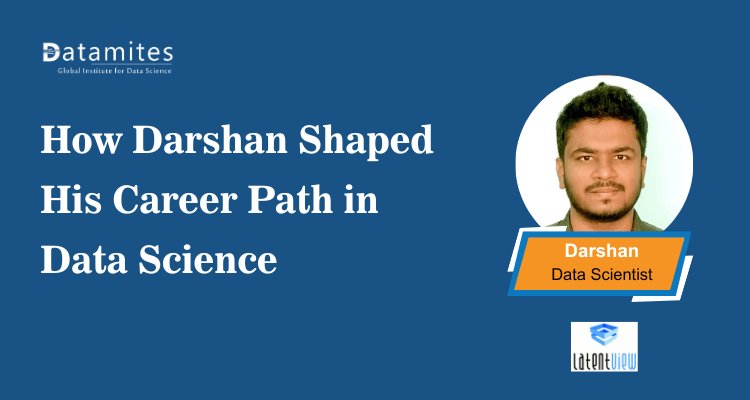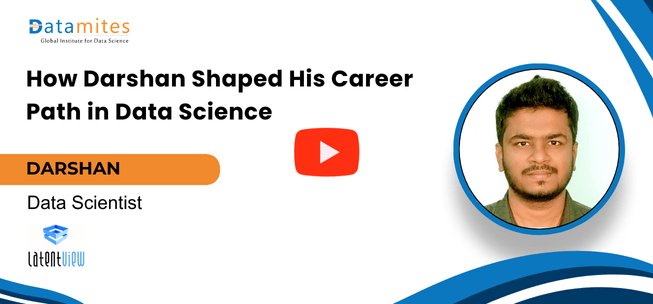How Darshan Shaped His Career Path in Data Science
Darshan’s journey highlights how continuous learning, skill development, and practical exposure helped him build a strong career in data science. His path reflects the importance of persistence and adapting to industry demands.

Breaking into data science takes more than interest, it requires solid technical skills, adaptability, and the ability to connect theory with practical application. Darshan’s story shows that persistence and a structured approach to learning can transform early challenges into stepping stones. His focus on building strong foundations, applying knowledge to real datasets, and steadily improving with mentorship became the core of his success.
From starting out as a student at DataMites to growing into an Assistant Manager leading multiple data science teams, Darshan’s career reflects how consistent effort and domain specialization can accelerate growth. His journey is proof that with the right mix of discipline, learning, and focus, it’s possible to carve out a rewarding career in one of the most competitive fields today. To see more inspiring journeys like his, watch DataMites success stories.
How Darshan Built His Career in Data Science with DataMites Institute
Let’s dive into Darshan’s journey through a series of questions and answers.
Q1: How did your journey in data science begin?
I started back in 2018 when I joined the DataMites classes. The sessions were held on weekends, which was tough to manage alongside work, but the foundational courses were very sharp and to the point. I’d attend classes on weekends and then apply the concepts to real datasets at my workplace during the week. That hands-on application helped me connect theory with practice.
Q2: What was the turning point that helped you transition into a data science role?
Once the course ended, I built a strong master CV with the help of the guidance provided. I got multiple interview calls, but initially, I struggled to clear them. That’s when I sought mentorship again, learned how to tackle interviews better, and shifted my focus to startups. Startups are more open to fresh talent if you can demonstrate technical ability. My first break came at Mathco, which became my stepping stone into data science.
Q3: Did you have prior programming knowledge before joining the course?
I had experience in Java, but Python was completely new. The course gave me the structured push I needed, introduction to packages, concepts, and practical exercises. From there, I practiced on my own until I became comfortable with Python.
Q4: What was your study pattern while preparing for interviews?
My approach was simple. Whatever was taught during the weekend classes, I’d go deeper into those topics during the week. Then, I’d apply them directly to datasets from my workplace. This cycle of learning and applying gave me confidence. Also, instead of spreading across multiple domains, I chose to specialize in marketing and banking, which helped me stand out in interviews.
Q5: What kind of questions did interviewers focus on?
In big companies, there were theoretical questions, but in startups and smaller firms, the focus was practical. They wanted to see how I approached problem-solving, what machine learning algorithms I’d choose, why I chose them, and how I’d build the architecture. Most interviews also started with an assessment round involving a dataset and a problem to solve.
Q6: Which skills are most important for data science aspirants today?
SQL is non-negotiable, it’s the bare minimum. Beyond that, Python is crucial, especially for data wrangling with libraries like Pandas. If you can clean and structure data effectively, you’re already solving most of the problem. Depending on your path, data science, data engineering, or consulting, you’ll need to add on specific tools, but SQL and Python are the foundation.
Q7: How does domain knowledge play a role in data science interviews?
Domain knowledge makes a huge difference. For example, marketing and CPG have different variables and problem statements. If you focus on a specific domain, you can solve problems in context, which sets you apart from candidates who only know generic models. Employers value specialists who understand both data science techniques and the business side of a domain.
Q8: What does your current role as Assistant Manager involve?
I lead 4–5 teams that handle algorithms running in the backend for YouTube marketing. My work is in R&D, which involves upgrading models, building new ones, and fine-tuning media mix and forecasting algorithms. We also work with cloud tools like Databricks, which is becoming a very sought-after skill. Every six months, we release internal products, and after validation, some of them are open-sourced.
Q9: Which tools and languages do you use most often?
Python and R are the primary ones. Python is great for data pipelines and batch processing, while R is faster when working with GPU-heavy modeling. A mix of both works well depending on the task.
Q10: How did you deal with rejection in interviews early on?
At first, I couldn’t clear 3–4 interviews. Instead of getting discouraged, I went back to my mentors and asked for feedback. I focused on fixing my weak areas and practiced interview scenarios. Every rejection became a learning point that helped me improve.
Q11: How important are projects and internships when building a data science career?
Projects are critical. Even if you don’t have formal internships, you can work on real datasets, open-source projects, or even company-related use cases. Interviewers want proof that you can apply concepts. A project portfolio carries more weight than just certifications.
Q12: What advice would you give someone coming from a consulting or non-technical background?
Leverage your domain knowledge, it’s already a strong asset. Then, focus on building your technical skills step by step. Learn Python, practice data wrangling, and start applying algorithms to real datasets in your domain. Even something like clustering CPG customers can give you a solid project to showcase. The combination of domain expertise and technical know-how is what makes a strong data scientist.
Refer to these articles:
- How Samir Built His Career as an NLP Data Scientist
- How Himanshi Built a Successful Data Science Career
- From Curiosity to Code: Thiyaneshwaran’s Data Science Journey
Key Takeaways from Darshan’s Journey into Data Science
Darshan’s path from student to Assistant Manager in data science shows how persistence, focused learning, and domain expertise can turn challenges into career-defining opportunities.
- Breaking into data science requires persistence, structured learning, and domain focus.
- Applying concepts to real datasets accelerates understanding and builds confidence.
- SQL and Python form the core technical foundation for data science roles.
- Domain specialization (e.g., marketing, banking, CPG) helps candidates stand out in interviews.
- Startups often provide the best entry opportunities for fresh talent in data science.
- Interviewers in startups focus more on practical problem-solving than theory.
- Projects and portfolios carry more weight than certifications alone.
- Mentorship and feedback play a big role in overcoming interview rejections.
- Cloud tools like Databricks are increasingly valuable skills for data scientists.
- Combining domain expertise with technical ability creates a strong competitive edge.
- Continuous learning and evolving with new tools is essential for long-term growth.
- Leadership roles in data science involve managing teams, upgrading models, and delivering solutions that impact businesses directly.
Refer to these articles:
- How to Become a Data Scientist in Bangalore?
- Data Science Course Fee in Bangalore
- How to Become a Data Scientist in Kochi?
- Data Science Course Fees in Kochi
Darshan’s career path shows that breaking into data science isn’t about shortcuts. It’s about consistent learning, applying knowledge to real problems, and carving out a niche. His move from a student to leading multiple teams proves that with the right mix of domain focus and technical skill, growth in this field is limitless.
If you're considering a career transition into data science, Darshan’s story is a strong reminder that there’s no better time to make the move. According to IMARC Group, the global data science platform market reached USD 15.2 billion in 2024 and is projected to skyrocket to USD 144.9 billion by 2033, growing at a CAGR of 27.08% from 2025 to 2033. With demand for skilled data professionals rising rapidly, Darshan spotted the opportunity early and chose to upskill through a program focused on practical learning, real-time project experience, and dedicated placement support, the essentials for growing in a competitive tech environment. Data science is now considered one of the IT courses in demand, and enrolling in a data science course in Bangalore, Pune, Hyderabad, Chennai, Mumbai, and Delhi can be the first step toward building a strong tech career.
He chose to enroll with DataMites Institute, a trusted name in Data Science, AI, Machine Learning, Python Development, and Data Analytics training. Backed by accreditations from IABAC and NASSCOM FutureSkills, DataMites training institute provided Darshan with expert-led sessions, practical experience, and career guidance that enabled a smooth transition into the data field.
With offline, online & flexible learning options, including data science training in Kochi, Pune, Bangalore, Hyderabad, Chennai, Ahmedabad, Coimbatore, and Mumbai, Darshan was able to pick a format that matched his schedule and learning preferences. Regardless of his original background in programming with Java, the industry-aligned curriculum and mentorship at DataMites empowered him, just like many others, to carve out a growing career in the data science domain.

